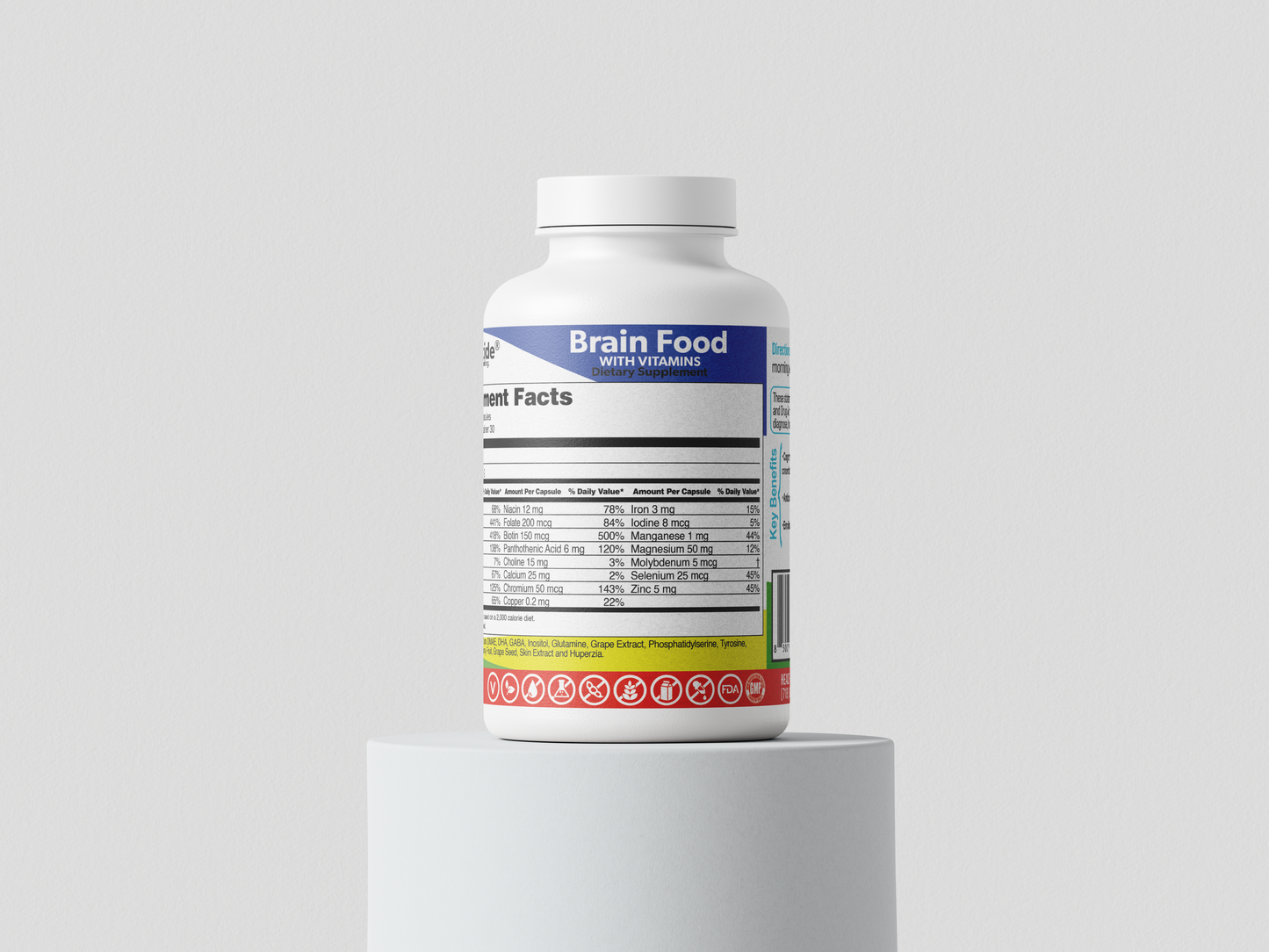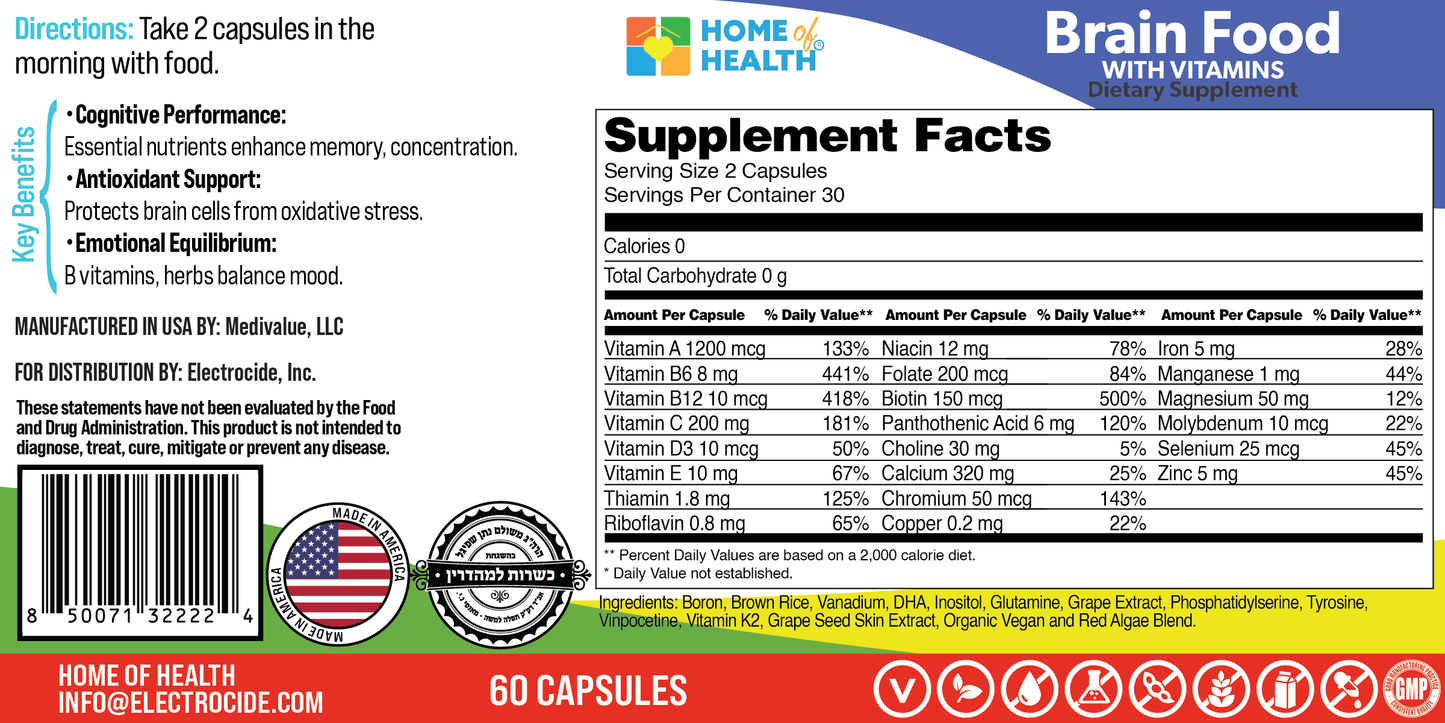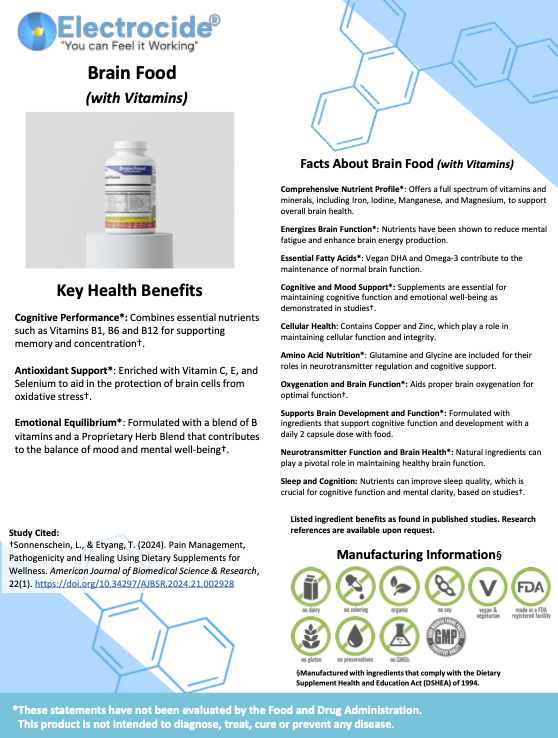Electrocide
Brain Food - Electrocide
Brain Food - Electrocide
Couldn't load pickup availability
Product Description
Brain Food is exactly that: food for your brain! We know the mind thrives on targeted nourishment, so we packed this plant-based supplement with essentials like vegan DHA to help maintain neuronal structures and B vitamins to aid in energy conversion for sharp thinking. And while we were at it, we thought, why not cover the whole body too? That's why we added a full suite of multivitamins, including vitamin C for collagen support and zinc for cellular repair, ensuring you get comprehensive daily coverage in just two capsules. Feeding your brain isn't isolated; the body and mind work in tandem, with nutrients like magnesium facilitating over 300 reactions to manage stress and iodine regulating thyroid function for metabolic balance. Dive into the cool tidbits: lutein accumulates in neural tissue to shield against oxidative wear, while selenium powers antioxidant enzymes for protection. Hypoallergenic, allergen-free, and made in the USA, Brain Food makes wellness accessible and exciting, empowering you to fuel focus, mood, and vitality naturally. Ready to give your brain (and body) the upgrade it craves?
*These statements have not been evaluated by the Food and Drug Administration. This product is not intended to diagnose, treat, cure, or prevent any disease.
Ingredient Details:
Ingredient Details:
Boron: A trace mineral involved in hormone regulation and bone metabolism, included to support enzymatic functions.*
Brown Rice Flour: Provides a hypoallergenic base for stability, included for nutritional foundation and gentle digestion.*
Calcium: An essential mineral vital for nerve transmission and muscle contraction, included to aid cellular signaling.*
Chromium: Assists in insulin function and glucose metabolism, included for blood sugar support.*
Copper: Participates in antioxidant enzymes and iron utilization, included for redox balance.*
Glycine: An amino acid precursor for neurotransmitters, included for metabolic and sleep-related processes.*
Iodine: Required for thyroid hormone synthesis, included to maintain metabolic rate.
Iron: Critical for hemoglobin formation and oxygen delivery, included for energy production.
L-Glutamine: The most abundant amino acid in the brain, included for gut-brain axis and neurotransmitter support.
Lutein: A carotenoid that accumulates in neural tissue, included for protection against oxidative damage.
Lycopene: An antioxidant carotenoid, included for cellular defense mechanisms.
Magnesium: Cofactor in numerous enzymes, included for nerve function and relaxation.
Manganese: Component of superoxide dismutase, included for antioxidant activity.
Molybdenum: Enables enzyme-mediated detoxification, included for sulfite and purine metabolism.
N-Acetyl-Cysteine Ethyl Ester: Enhances glutathione levels, included for cellular antioxidant capacity.
Nickel: Trace element in urease enzyme, included for metabolic contributions.
Potassium: Regulates electrolyte balance and nerve impulses, included for muscular and cardiovascular function.
Proprietary Herb Blend: Select botanicals combined for synergistic effects, included to enhance nutrient absorption.
Selenium: Integral to selenoproteins for thyroid and immune roles, included for oxidative protection.
Vanadium: Mimics insulin in glucose uptake, included for metabolic regulation.
Vegan DHA: Algae-derived omega-3, included for brain lipid structure.
Vegan Omega-3: Plant-based fatty acids, included for anti-inflammatory pathways.
Vitamin A (Retinol): Supports gene expression and vision, included for immune modulation.
Vitamin B1 (Thiamin): Converts carbohydrates to energy, included for neural metabolism.
Vitamin B12 (Cyanocobalamin): Facilitates myelin synthesis, included for nerve integrity.
Vitamin B2 (Riboflavin): Part of flavoproteins for redox reactions, included for energy pathways.
Vitamin B3 (Niacin): Precursor to NAD/NADP, included for cellular repair.
Vitamin B5 (Pantothenic Acid): Forms coenzyme A, included for acyl group transfer.
Vitamin B6 (Pyridoxine): Involved in amino acid transamination, included for neurotransmitter production.
Vitamin B7 (Biotin): Carboxylase cofactor, included for fatty acid synthesis.
Vitamin B9 (Folic Acid): One-carbon donor in methylation, included for DNA replication.
Vitamin C (Ascorbic Acid): Electron donor in hydroxylation, included for connective tissue health.
Vitamin D3 (Cholecalciferol): Activates VDR for gene transcription, included for calcium homeostasis.
Vitamin E (Alpha-Tocopherol): Chain-breaking antioxidant, included for lipid peroxidation prevention.
Zinc: Cofactor in over 300 enzymes, included for protein synthesis and immunity.
Suggested Use:
Suggested Use:
Directions: Take 2 capsules in the morning with food.*
Cautions/Contraindications:
Cautions/Contraindications:
What to Avoid: Consult a healthcare professional before use, especially if pregnant, nursing, taking medication, or have a medical condition. Discontinue use if adverse reactions occur. Store in a cool, dry place.*
Share






